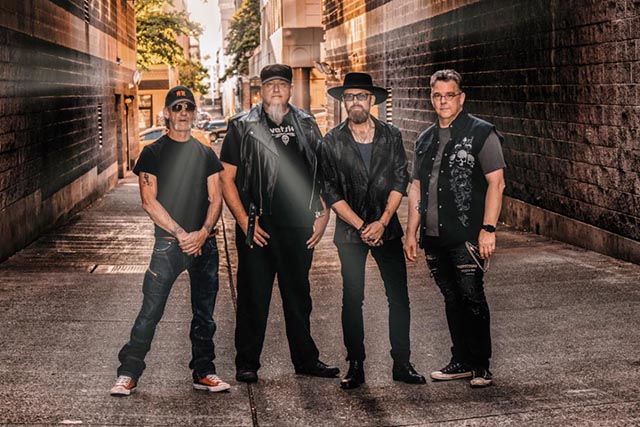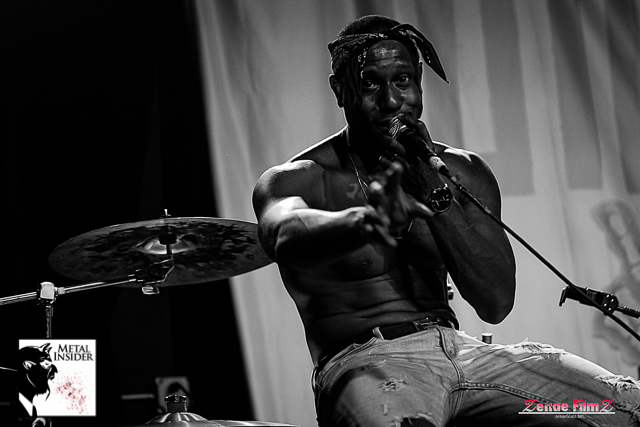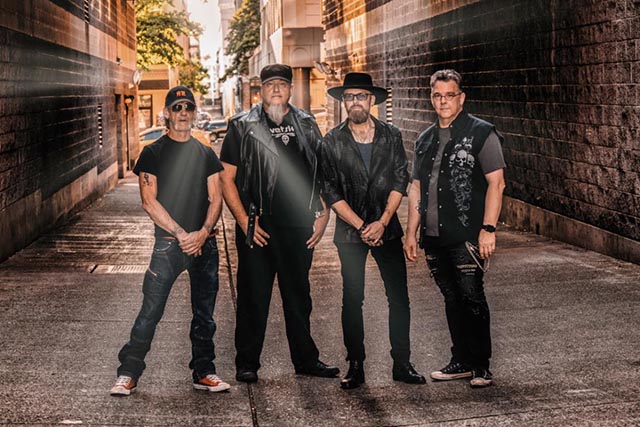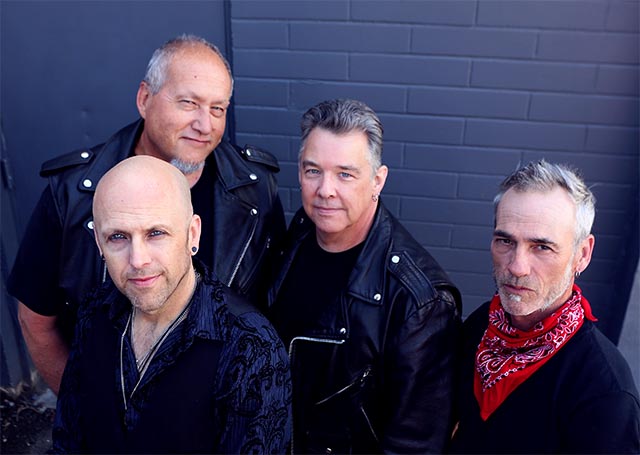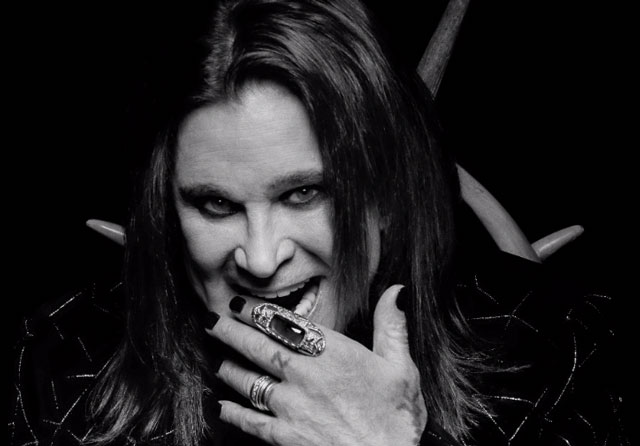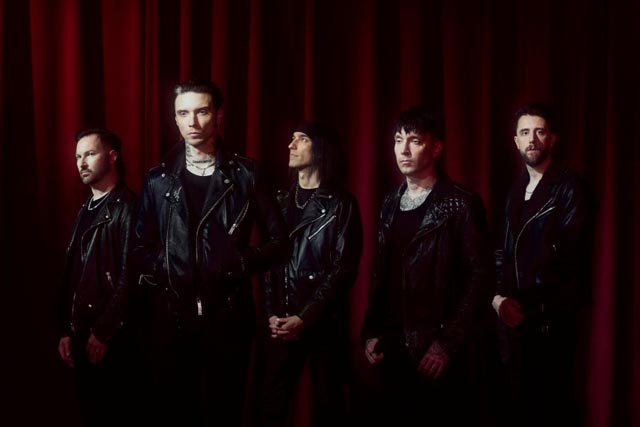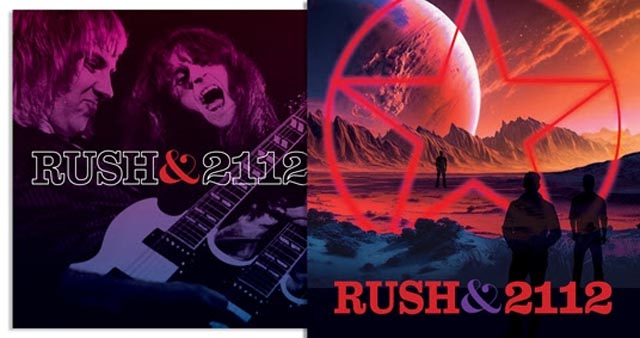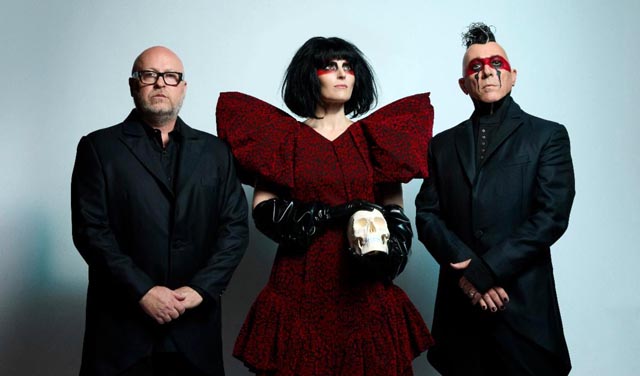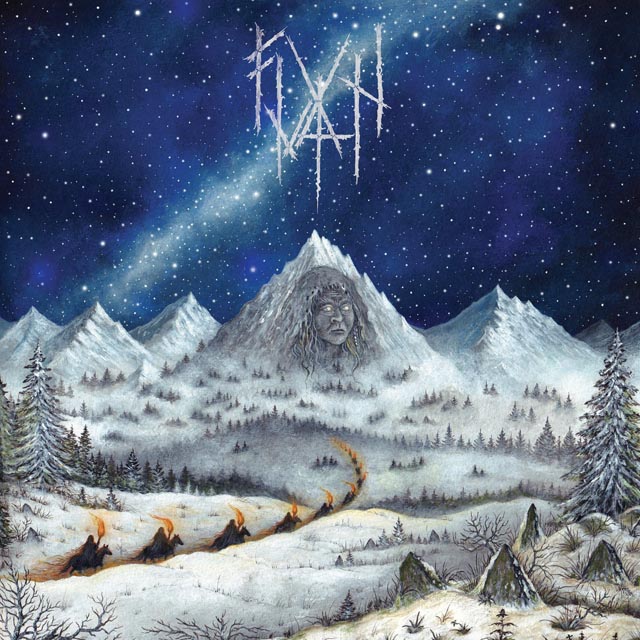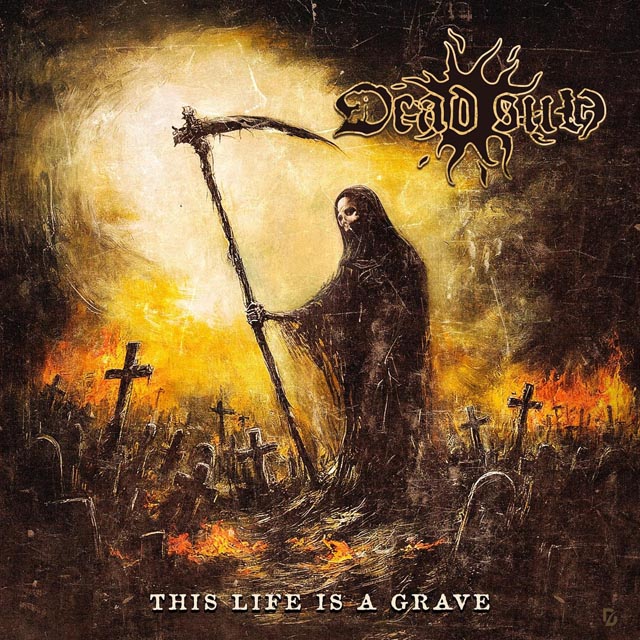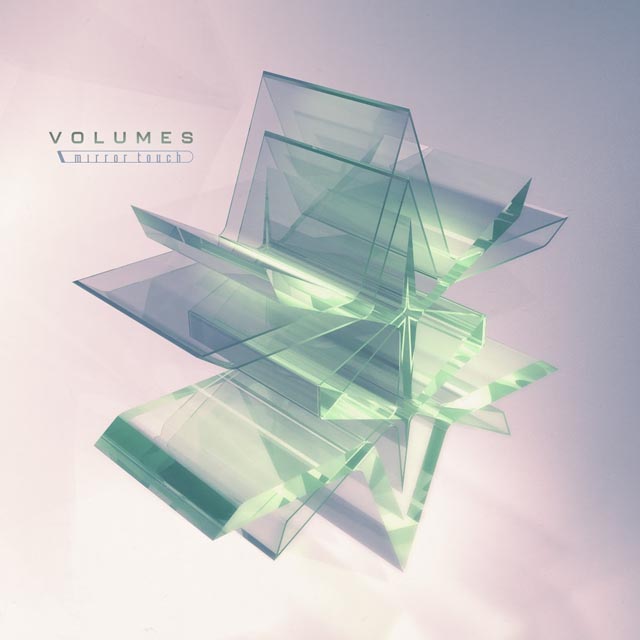The classic phrase “time flies” feels more relevant as we age. We put things off, telling ourselves, “I’ll get to it tomorrow,” only to find that weeks, or even months, have disappeared in a blur. This idea takes center stage in Seattle’s Rivetskull’s sophomore release, Absence of Time, which dropped this past June. While some are shocked that 2024 is already in its final quarter, others may feel the year has dragged on. The concept of time is woven throughout the album. Metal Insider spoke with vocalist Chad McMurray earlier this year, discussing the record’s theme and more.
What was the writing process like for the new album, Absence of Time?
For us, it’s different because I live in LA, the band’s based in Seattle. I’ve been down here about six, seven years now. Everybody has their responsibilities that they do. The two Marks in the band, I call them the riff-maesters, so they come up with riffs and hooks and things, and then that gets sent to me. I go through and slice and dice it in Pro Tools down here, and then start thinking about lyrics and melodies and what the topics are and subject matter. And then we just demo things back and forth. And not everything makes it, like with a lot of bands, and the stuff that we think is good, we pushed it forward, and that’s what this new record came out of.
What inspired the title, Absence of Time?
I think the inspiration is pretty much something I think as everybody starts to age, you realize how little time is actually left. And what is time? So, it’s an absence of time. And so there’s a lot of that kind of subject matter on this record too, that touches with that, a little bit of the, we’re not as immortal as we once thought we were when we were in our teens and 20s.
Nope, tell me about it.
And time moves faster and faster, and it’s just crazy.
There’s just not enough time in one day to get everything done, so I’m with you on that.
It’s insane. And the further along it gets, the more organized you have to be. The more organized I get, I think it seems like things still slip and it’s like, what’s going on? I’m more organized than I’ve ever been and there’s still things not getting done.
Yep. And you even wake up even earlier and you’re like, “Where did the day go?”
Right? I know. It’s like 9:00 and already, I’m just like, “Ooh, boy. I’m late.”
What were some challenges that you guys faced during the recording process? I guess you mentioned there’s some limitations with the location. You’re in LA. They’re in Seattle, right?
Yeah. You know what? This one went pretty well. I wouldn’t even say we had a lot of challenges, because the first album that we did was self-produced and our timing was really great. Because it was all right around when COVID and everything hit, so it was a self-produced record. We didn’t have any new material yet, but we thought that that album could be better, and that’s when we went back into London Bridge Studios up in Seattle and worked with Jonathan Plum. We had Matt Hyde down here mix and master it. So, we felt like we already had a team together. That part wasn’t on the re-release of the album and it turned out great. It was like it sounded like an entirely different record even though it was the same record.
When we went into Absence of Time, we demoed things ahead of time and actually knew what our team was going to be, and were able to do pre-production work with Matt Hyde, and he had some great suggestions and inputs and then would be tracked. Once we all got in the studio, then that was great. That’s when we can really get the chemistry of the band and get everything working how it is, as opposed to everybody emailing your parts and it’s not quite the same.
I do like that you guys are doing more of an independent route still too.
Yeah. Not necessarily by choice, mind you, but that’s the way it works out a lot these days. It’s like the music industry has changed so much. Every decade, it goes through something new technology-wise. So we’re always trying to adapt to that, and the only way you can is to move forward and do what labels did once. Labels are still viable, but they’re far, few in-between, I think, with the saturation of how much music’s actually out in the market.
More bands seem to be dropping from labels nowadays and going the independent route, so it sure is a mix.
And you can do it, and I feel like with the second record here, we’ve got a really good team now moving forward with our PR and social media. And even though that’s usually stuff that comes with a label, we’ve figured out a way to do it ourselves. Yeah, if you can keep that power yourself, that puts you in the biggest position of power, is when you can actually grow your fan base, get good distribution, and get your product out there without really some of the help of the big guys.
Can you discuss more about the opening track, “Hellbound?”
Hellbound, that was just one of those things about fighting your inner demons more or less, where sometimes you realize you’ve got a problem but sometimes you want to acknowledge it, but at the same time, you just dive deeper into it. So, going straight down to hell, just keep going down and down and down, but then eventually you figure it out or you don’t. But that’s where Hellbound came from, was just more about that inner struggle with various things. And when I write lyrics, I try to do it from the point of, it’s a choose-your-own adventure. I know what I’m writing about, but I try to keep it generic enough where it could mean something to each person differently. Each person that listens to it could have a different meaning from it based on what it might mean to them, based on what they’re going through at the time.
Yes. Everybody loves to interpret music in their own way about anything. And actually, because you mentioned COVID was when you’re able to re-record your debut album and get everything together, now, you have a song on the sophomore record called “Isolation.” Because of the whole time of everything, was this written based on pandemic experiences or anything else?
Yeah, it was, actually. And then it also, spinning off of that as well, it’s just sometimes just that feeling of being alone, thinking that you don’t have anybody else around and whatnot. Definitely it’s a double meaning type thing, because the pandemic definitely made us all feel very isolated, of course, and then I just took it a little step further about what it means individually.
Between this album and the debut and how you guys started even before the first album was made, how do you think the band has evolved since the formation?
I think we’re all so into different types of music and genres that I think that helps keep things fresh, because at least with me, a lot of times what I’m listening to also influences how I write based on who I’ve been influenced by. Obviously, it’s great to be influenced by your people that you look up to from growing up and who influenced you from way back, but it’s fun to be influenced by current music too. And it’s out there. If you look for it, it’s out there. I think based on how different we all are and what we actually go to, to listen to normally, and where we intersect and how we grow, it’s been a really nice progress. And with this one too, it’s like with anything, once you go through a couple of times in a recording studio, you start to get to know people really well on a different level. So, that chemistry and the bond just continues to grow, or at least you hope it does.
Who are some of your influences?
Me personally, geez, I’m all over the board. I would say in the early days, I was a prog guy, so Rush, Genesis, Yes, King Crimson, Pink Floyd. Things like that definitely got me going as a kid. One of my first concerts ever was the Def Leppard Pyromania tour, which when you’re 13 years old, I was like, “I think I want to do this when I grow up.” It’s one of those things. Second concert was Ozzy. Always been a huge Ozzy fan, so seeing him on the Bark at the Moon tour was… Again, you’re 13, 14 years old, and here comes this crazy guy running down the stairs with ripping his shirt open, these big bats open their wings and fireworks everywhere. That’s the first song. He kicks into I Don’t Know. It’s like, what? So, definitely that.
But then I also, really, I started early with violin back in elementary school, so I got into classical, which probably led me into progressive rock and stuff too. But I love classical and I listen to jazz almost every day, so a lot of those things, I pull from. But we still try to keep what this band is, which is where we all intersect is just really cool, I think. I hate to use the word throwback, because I think it’s got newer elements to it, but just a recreation of a ’70s, ’80s classic metal and rock sound.
Nice. And classical, if it was in modern days, it would be metal.
Yeah, exactly. Actually, I had this conversation the other day. I felt like metal actually… People say, “Who was the first metal band?” I’m like, “Mozart?”, because he kind of was. When you think of what he did and how he branched off from what everybody else was doing at the time, and he had that total metal “I don’t give a fuck” attitude and just did whatever he wanted to do, he was metal, man. For the 1700s, that was metal.
What plans do you guys have for tours or shows? What can you reveal to us (summer tour has passed, upcoming show is in December, check out tour dates here)?
Right after this call, I get to hop into an RV and we’re taking off. Our first show on this leg of this tour is going to be, we’re opening for Artillery, the Danish metal band. They’re doing their 40th anniversary tour, and so there’s four touring support acts and we’re one of those four. And then we take off. San Diego is our first show tomorrow night, and then we’ll be out doing 20 shows in 20 days, which is going to be a lot of driving and a lot of playing, but it’s going to be fun. We haven’t really been much of a touring band. We’ve been more of a studio band, so we’re starting to explore and get out there and see, “Okay. Well, it’s time to…” You can do a lot online and a lot to build your following, but then you have to get out there and let people see it.
But we’re trying to figure out how to do it as smart as we can, because obviously, without a label or somebody that’s helping cover the cost of tour budgets and things like that, it’s pricey out there, even just gas alone, so you have to be pretty cautious about how we do it. We’re going to see how this goes, then probably some plans and some things maybe a little bit for fall, do some spot shows. We’ve submitted to a lot of different overseas festivals, so we’d like to hit over there.
We’re starting to find out, based on the amount of advertising that we’ve been doing and social media reach, we’re starting to find pockets where we have a bigger fan base than we thought, so we’re going to try to target some of those as well, which is East Coast. People really like us on the East Coast. It’s cool. And then content.
I guess you’ll either get addicted to touring life or not want to do it ever again.
Yeah, touring is an interesting thing. It’s fun when things go well, and even when they don’t, you have to rise above and figure out how to deal with flat tires, mechanical problems, things. The thing about this tour that’s a little bit scary is that there’s not a lot of time for error on things. We’ve got a couple of 12-hour drives in-between shows, which pretty much makes you leave one venue and try to haul ass to get to your next soundcheck. Not a lot of time for, room for error on this one, so that can be a little stressful, but hopefully, fingers crossed, everything will go just fine.
Is there anything that you wanted to say or add about the new album?
I think it’s a really cool record, and it’s weird to say that because obviously, you hope that… You’re in the band and you write this stuff, but it’s really hard for me to find something when I’m writing to be satisfied with it. And some of these songs on this record were written three times over lyrically, because we’d get the music beds where we think they are after I’ve come up with the arrangements and what they’re going to be, and then keyboards made a little bit more of a feature on this album, which I was a little hesitant being a metal band. It’s like, “Okay, we got to be careful here. We don’t want to get too keyboard-y. We want to keep this thing pretty straight.”
But some of the chords and the textures and the sounds that I had used were more analog, ’80s style synth, so I think it fit well and it just made some really cool voicings. And so we had to end up keeping it, because it became too important to the song to just use it as just a writing tool. I think just we experimented more with some vocal stacks and harmonies, and like I said, the addition of the keyboards. I think it’s a nice follow-up album to the first. I think whoever did hear the first one that liked it, I think it’s a really nice second album, a nice follow-up.
I’m pretty proud of it. Because like I said, I’ve sat there before and I’d be completely done with a song and then I’m like, “But do I really like it? Is it the best it can be?” And then eventually, you gotta cut it loose and call it good. Otherwise, you’ll just never release anything or you’ll drive yourself into an institution. But then once it finally hits and you go, “You know what? That’s catchy. I kind of like that,” then I know, “Okay, it’s ready for the public.”
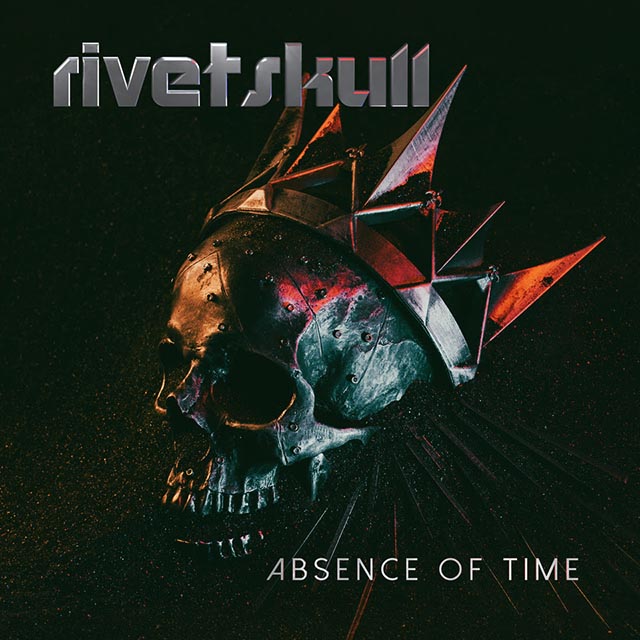
Feature Image Photo Credit: Mike Savoia

